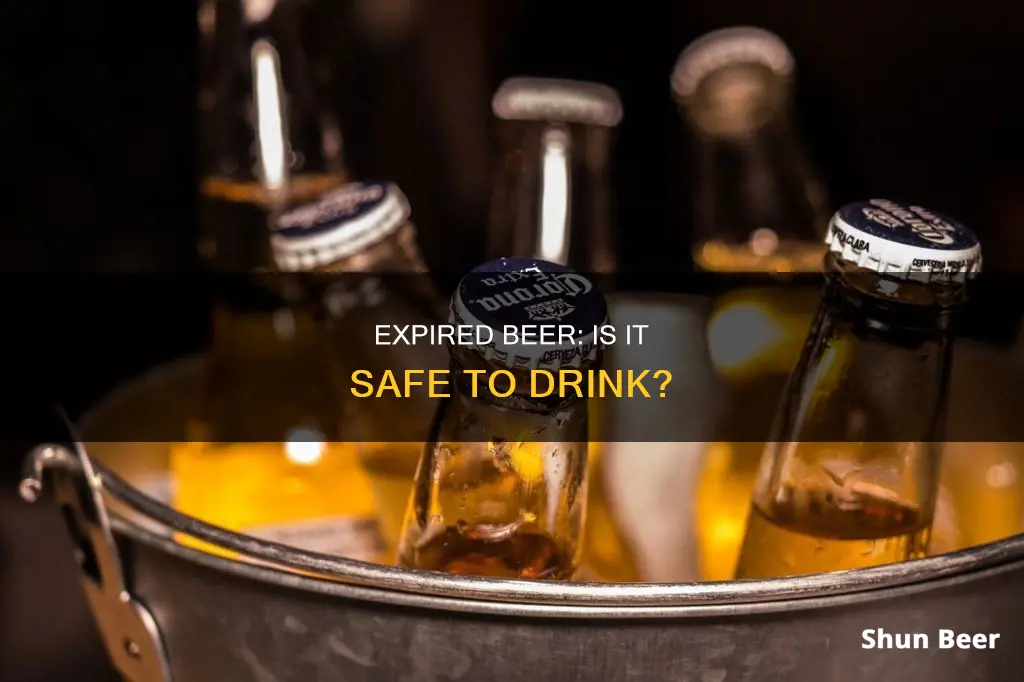
Beer lovers, rejoice! If you've ever wondered whether it's safe to drink expired beer, the answer is yes. Unlike other food and drink products, beer doesn't expire in the same way. While it's always recommended to drink beer as fresh as possible, it won't make you sick if consumed past its best before date. The fermentation process, low pH level, and alcohol content in beer make it unfriendly to microorganisms, so even if it sits on the shelf for years, it's unlikely to pose any health risks. However, the taste of beer can change over time, and oxidation can give it an unpleasant wet cardboard flavour. So while you can safely drink expired beer, it might not be the most enjoyable experience for your taste buds.
What You'll Learn

Is drinking expired beer bad for your health?
It's happened to the best of us. You find a long-lost can of beer tucked away at the back of the fridge or an untouched six-pack in the pantry. You're keen to crack one open, but you hesitate: is it still safe to drink?
The short answer
In almost all cases, yes, it is safe to drink expired beer. Beer doesn't expire in the same way that other foods do. The fermentation process, low pH level, and alcohol content make it difficult for harmful microorganisms to survive. Even if a beer sits on the shelf for years, as long as it's sealed, it's unlikely to make you sick.
But what about the taste?
The taste of beer, however, will change over time. The delicate flavours and aromas that brewers design into their recipes will fade and change. You might notice off-flavours like wet cardboard or a vinegary taste, which is a sign that bacteria have gotten into the beer.
There are four main culprits that can cause flavours to go awry: oxygen, heat, light, and time. Oxygen interacts with the compounds from malt, yeast, and hops, causing oxidation and a disappointing papery taste. Heat speeds up oxidation, so it's best to store beer in a refrigerator. Major changes in temperature, like going from an ice-cold cooler to a hot car, can also affect the taste.
Light, especially UV light, can also cause a chemical reaction in hops, resulting in an unpleasant skunky taste. That's why most beer bottles are tinted brown, and why it's best to store beer in a dark place.
There are a couple of rare situations where you should throw out an old bottle or can of beer. If your beer has lost its fizz, it's a sign that the seal was broken at some point, and the flavour will be affected. If a beer that isn't supposed to be tangy has a vinegary taste, it's an alert that bacteria have gotten in, and you should toss it out.
So, is drinking expired beer bad for your health?
In summary, drinking expired beer is generally not harmful to your health. However, it's important to note that the taste of the beer will likely be affected, and it may not be a pleasant drinking experience. To ensure the best taste, it's recommended to drink beer as fresh as possible and store it in a cool, dark place.
Beer and Cipro: Is It Safe to Drink?
You may want to see also

What causes beer to expire?
Beer is made from organic plant ingredients that eventually decay. Brewers work to make the beer last as long as possible, and they have some major advantages – the alcohol content, beer's low pH, and the antimicrobial activity of hops. When properly brewed and packaged, the only things in your beer are the ingredients and the smallest amount of air.
It is impossible to package beer without a small amount of oxygen coming along with it. Over time, that oxygen can change the beer itself, sometimes adding a stale flavour described as "cardboard". Not all beers are affected by oxidation in the same way, though. For example, malty beers sometimes develop sweet, grainy, caramel, and toffee notes. The speed of oxidation can be affected by major temperature swings, so it's best to keep your beers cool.
A beer's hoppiness can also diminish over time. Hop aromas are very time-sensitive, so the citrusy, floral, or tropical hop aromas we love in hop-forward beers will disintegrate over time.
Finally, you've probably heard of "skunked" beer. It's a common misconception that skunky beer is caused by temperature swings, but it's actually more the result of light exposure. The chemicals in hops react poorly with ultraviolet light. That's why you'll see many bottled beers in dark-coloured glass – it allows less light to get through and impact the liquid.
Antacids and Beer: A Safe Mix?
You may want to see also

How can you tell if a beer has expired?
Beer doesn't expire in the same way perishable foods do, but it does have a shelf life, and it's best to drink it as fresh as possible. This is because, over time, the taste of beer changes, and what was once refreshing could become a real stinker.
There are a few ways to tell if a beer has expired. Firstly, check the packaging for a "best before" or "enjoy by" date. If the beer has exceeded this date, it may have lost its freshness, and the flavour may have changed. Secondly, if the beer has lost its fizz, this is a sign that the seal was broken at some point, and the beer will have been exposed to oxygen, which can affect the taste. If a beer that isn't supposed to be tangy has a vinegary taste, this is another sign that bacteria has gotten in, and it should be thrown out.
Even if a beer doesn't have an "enjoy by" date, there are some other clues to look out for. If you've stored it in direct sunlight, it may have been affected by UV light, which can cause an unpleasant skunky taste. Heat can also cause beer to spoil, so it's best to store it in a refrigerator.
If you're still unsure, the best test is usually to take a sip. If the beer tastes like wet cardboard, has gone overly sweet, or has a skunky flavour, it's probably past its best.
Beer Drinking in Yellowstone: What's Allowed?
You may want to see also

How long does beer last?
Beer has a best before date, not an expiration date. This means that it is still safe to drink after the date has passed, but the taste will likely have degraded. The fermentation process, low pH level, and alcohol content make it difficult for harmful microorganisms to survive, so even if a beer sits on the shelf for years, it's unlikely to make you sick. However, if the seal is broken, the beer should be discarded.
The length of time that beer lasts depends on the type of beer and how it is stored. Most beers are brewed to be drunk fresh, and IPAs in particular are best consumed within 60-90 days of packaging. Other beers, such as stouts and porters, can last for years. If stored in a cold, dark place, such as a refrigerator or cellar, beer can last for a long time. Exposure to oxygen, heat, and light can cause the beer to go bad more quickly.
Some signs that beer has gone bad include a loss of carbonation, a vinegary taste, or a "skunky" smell caused by exposure to ultraviolet light. However, these signs do not mean that the beer is unsafe to drink, just that the taste and quality have diminished.
Pregnancy Diet: Is Diet Root Beer Safe to Drink?
You may want to see also

How to store beer to prevent it from expiring?
Beer is best stored in a cool, dark place, such as a refrigerator, basement or cellar. The optimal temperature range for storing beer is between 45 and 55 degrees Fahrenheit (or 13°C and 55°F). Beer should be stored upright to minimise air contact, which can cause oxidation and a loss of carbonation.
If you don't have access to a refrigerator, or your beer won't fit, there are other options for storage. A basement or cellar is a good choice, as these areas are often relatively cool and dark. You can also store beer under a bed or in a closet. Just be sure to keep it away from sunlight and fluorescent light, as exposure to light can cause beer to become "skunked" or "lightstruck", breaking down its flavour components and giving it an unpleasant taste and smell.
It's also important to note that not all beers age the same way. Beers with a higher ABV (above 8%) tend to last longer, as do sour and smoked beers. IPAs and other hop-centric beers, on the other hand, have a shorter shelf life and should be consumed fresh.
If you're planning to store beer in a refrigerator, it's best to drink it within three months of the bottling date. Pasteurised beer will last longer (up to a year), but unpasteurised beer should be consumed within three months to ensure optimal freshness.
Drinking Beer While On Duty: What's Allowed?
You may want to see also
Frequently asked questions
Yes, drinking expired beer is generally safe. Beer has a "best before" date, not an expiration date. This means that it is safe to drink but may not taste as good.
The oxidation of compounds in the beer causes a papery taste, and the volatile aromas from hops tend to dissipate.
Check the "best before" date on the packaging. If there is no date, look for signs of oxidation, such as a vinegary taste or a loss of fizz.
Keep your beer in a cool, dark place, preferably a refrigerator. If stored at room temperature, ensure that it is not exposed to sunlight.







